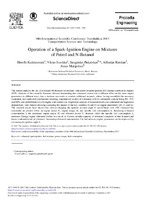Operation of a Spark-Ignition Engine on Mixtures of Petrol and N-Butanol

Date
2017Bibliographic entry
Operation of a Spark-Ignition Engine on Mixtures of Petrol and N-Butanol / H. Kukharonak [et al.] // 10th International Scientific Conference Transbaltica 2017: Transportation Science and Technology. – 2017. – Vol. 187. – P. 588-598. – (Procedia Engineering). – DOI: 10.1016/j.proeng.2017.04.418.
Abstract
The Article analyses the use of n-butanol (biobutanol) in mixtures with petrol in spark-ignition (SI) internal combustion engines (ICE). Analysis of the scientific literature allowed determining that n-butanol content had a different effect on the same engine parameters in different tests, thus a decision was made to conduct additional research, where, having assembled the necessary equipment and conducted experimental planning, experimental studies of n-butanol (with its volumetric content being 0%, 20% and 40%) and petrol blends in a SI engine were carried out. Regression analysis of research results was conducted and regression dependences were formed allowing evaluating the impact of the key variables (delta and theta) on engine parameters (M-e, P-e and b(e)). The research results have shown that without changing the ignition advance angle theta, petrol blend with 10% n-butanol has essentially no adverse effect on engine power P-e, engine torque M-e and specific fuel consumption be. Increasing n-butanol concentration d, the maximum engine torque M-e and effective power P-e decrease, while the specific fuel consumption b(e) increases. Energy engine indicators decline as a result of a lower calorific capacity of n-butanol compared to that of petrol and lower combustion rate of n-butanol. Increasing n-butanol concentration d in fuel mixture, engine parameters can be improved by advancing the ignition angle theta.
